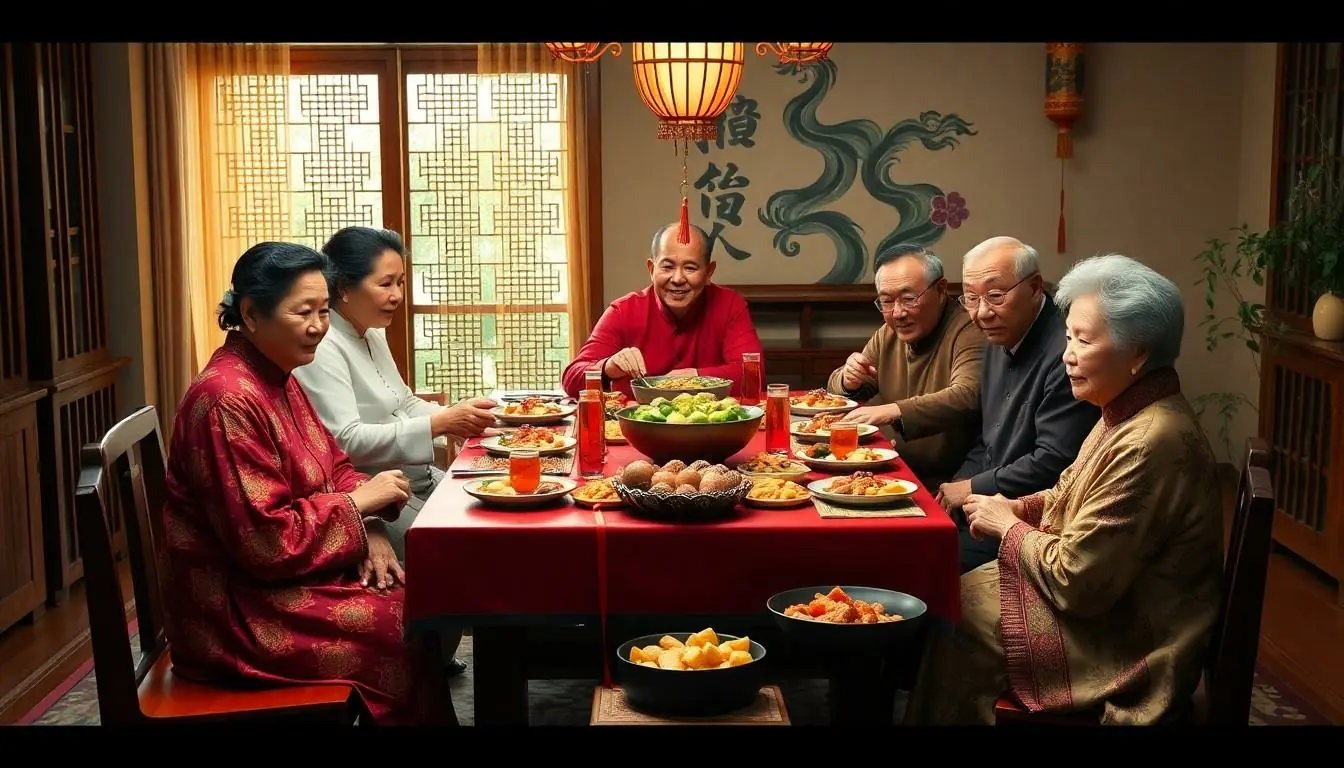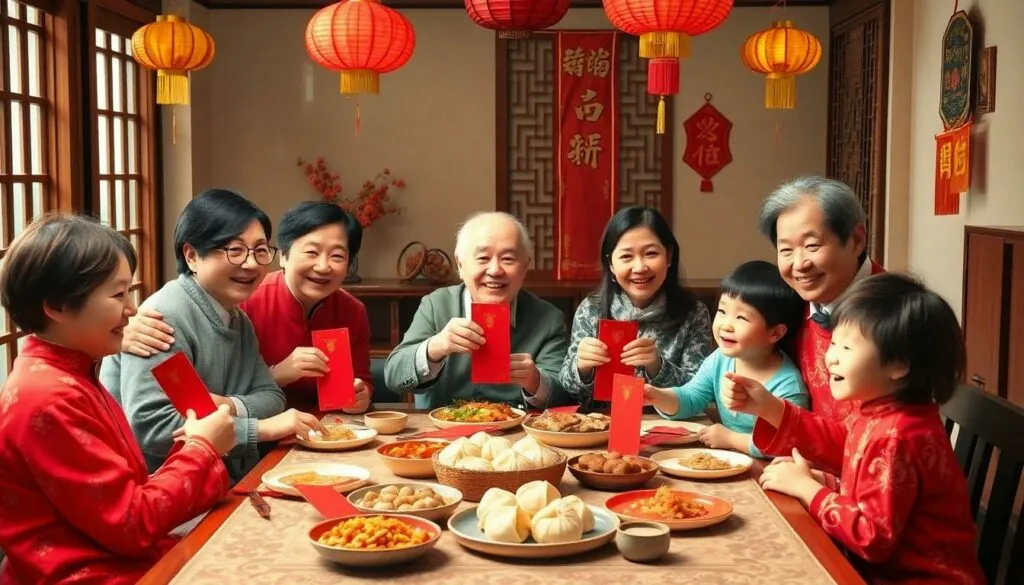Table of Contents
ToggleChinese family traditions are a vibrant tapestry woven with centuries of history, culture, and, let’s be honest, a fair share of delicious food. From the lively gatherings during the Lunar New Year to the heartwarming rituals of ancestor worship, these customs foster a sense of belonging and unity that’s hard to resist. Imagine a family reunion where the food is as plentiful as the laughter—now that’s a party worth attending!
But it’s not just about the feasting; these traditions also pass down values and wisdom from one generation to the next. Whether it’s the importance of filial piety or the art of giving red envelopes, each custom holds a lesson wrapped in love and sometimes a little bit of humor. Dive into the world of Chinese family traditions and discover why these practices are more than just rituals; they’re the glue that holds families together, one dumpling at a time.
Overview of Chinese Family Traditions
Chinese family traditions hold deep historical and cultural significance. These customs emphasize family cohesion and unity, shaping relationships across generations.
Importance of Family in Chinese Culture
Family occupies a central role in Chinese society. Respect for elders fosters strong familial connections. It’s common for multiple generations to live under one roof, promoting shared responsibilities and values. Relationships extend beyond immediate family, often including distant relatives, which creates a vast support network. Additionally, family gatherings celebrate significant events, reinforcing bonds and ensuring traditions are passed down.
Key Values and Beliefs
Values and beliefs shape Chinese family traditions. Filial piety embodies respect and care for one’s parents and ancestors. This principle influences daily interactions and decisions within the family unit. Honor plays a vital role; maintaining one’s family reputation is crucial. Moreover, traditions emphasize harmony, urging members to prioritize collective well-being over individual desires. Celebrations, rituals, and ceremonies reflect these core beliefs, reinforcing familial ties and heritage.
Family Structure and Roles

Chinese family structure emphasizes respect and interdependence among members. Traditional roles define responsibilities and expectations within the household.
Traditional Hierarchies
In a traditional Chinese family, the hierarchy holds significant importance. Often, the eldest male serves as the head of the household, making crucial decisions. Elders receive respect and authority, guiding younger generations. Sons typically assume responsibilities for family lineage, while daughters often join their husband’s family upon marriage. This structure ensures financial and social stability, reflecting values like filial piety and reverence for ancestors. Family gatherings reinforce these hierarchies, showcasing respect for elder family members through customs and rituals.
Modern Changes in Family Dynamics
Modern life influences family dynamics in China. Urbanization leads to smaller family units, often resulting in nuclear families. Many young adults choose individualism, focusing on personal goals. Women increasingly pursue careers, reshaping traditional gender roles and responsibilities. While respect for elders remains, the decision-making processes have become more democratic. These changes reflect shifting societal norms yet retain core values connecting family ties. Young families still honor traditions during celebrations, but adaptability to contemporary lifestyles defines modern Chinese family structures.
Celebrations and Festivals
Celebrations and festivals play a vital role in Chinese family traditions, weaving together cultural values and familial unity.
Lunar New Year Traditions
Lunar New Year marks the most significant celebration in Chinese culture. Families gather for reunion dinners, emphasizing the importance of togetherness. Traditional foods, like dumplings and rice cakes, symbolize prosperity and good fortune. Elders distribute red envelopes, filled with money, to children as blessings for the year ahead. Festivities also include firecrackers to ward off evil spirits, adding excitement and vibrancy. Special customs like cleaning the house before the New Year help eliminate bad luck, setting a positive tone for the months to come.
Other Significant Family Celebrations
Other significant family celebrations include the Mid-Autumn Festival and the Dragon Boat Festival. The Mid-Autumn Festival focuses on mooncakes, which symbolize reunion and completeness. Families appreciate the full moon while sharing these delicacies, fostering connections and memories. The Dragon Boat Festival honors Qu Yuan with boat races and sticky rice dumplings, promoting teamwork and camaraderie. Ancestor worship, often part of these events, deepens the sense of family lineage and respect for past generations. Each of these celebrations reinforces core values, ensuring traditions endure through time.
Rituals and Customs
Chinese family traditions encompass various rituals and customs that play an essential role in maintaining cultural identity and unity.
Ancestral Worship Practices
Ancestral worship holds significant importance within Chinese families. Families honor ancestors through regular rituals, employing offerings of food, incense, and paper money. These practices occur during key occasions like the Qingming Festival, when families visit graves, cleaning them as a sign of respect. Connections deepen through these acts, reinforcing bonds across generations. Communication with ancestors occurs, as family members seek guidance in daily life. Rituals emphasize gratitude, ensuring respect for lineage remains central to family values.
Marriage and Family Ceremonies
Marriage ceremonies reflect deep-rooted customs and beliefs in Chinese culture. Weddings often incorporate traditional elements, such as tea ceremonies, where couples serve tea to elders. Serving tea honors family hierarchy and symbolizes respect. Celebrations feature vibrant adornments, symbolizing prosperity and happiness. Families often invite numerous guests, showcasing communal support and shared joy. Post-marriage, rituals like the bride’s home visit reinforce ties between families. Each ceremony serves as a platform to express love and gratitude, further strengthening familial connections within the community.
Impact of Globalization on Chinese Family Traditions
Globalization significantly reshapes Chinese family traditions, introducing both challenges and adaptations.
Influence of Western Cultures
Western cultures impact Chinese family dynamics, often encouraging individualism over collective values. Exposure to Western lifestyles fosters a blend of traditions, with younger generations embracing new practices while holding onto essential customs. Celebrations such as Christmas and Valentine’s Day gain popularity among urban families, creating a fusion of cultural festivities. Increased migration leads to cultural exchanges, prompting families to incorporate diverse customs into traditional celebrations. Family structures shift as parental authority softens, allowing more democratic decision-making. In addition, Western media influences perceptions of love and relationships, redefining marriage ideals within Chinese society.
Reclamation of Traditional Practices
Despite globalization, many Chinese families emphasize the importance of reclaiming traditional practices. Younger generations often seek to reconnect with their heritage, participating in ancestral worship and traditional festivals. Family reunions during significant events, like Lunar New Year, become opportunities to reinforce cultural identity. Some families engage in tea ceremonies, ensuring respect for lineage and fostering a sense of belonging. Reviving age-old customs, such as the Qingming Festival, highlights the continued relevance of gratitude and respect in modern life. This reclamation reflects a commitment to preserving cultural roots while navigating the complexities of contemporary society.
Chinese family traditions embody a rich cultural heritage that continues to shape identities and values today. The emphasis on respect for elders and the importance of familial bonds illustrate a commitment to maintaining connections across generations. As modern life introduces new dynamics, these traditions adapt while still honoring their roots.
Celebrations and rituals remain central to family life, providing opportunities for unity and shared experiences. Whether through ancestral worship or festive gatherings, these practices reinforce the significance of family in Chinese culture. As younger generations navigate the complexities of contemporary society, the desire to reconnect with their heritage ensures that these cherished customs endure.







